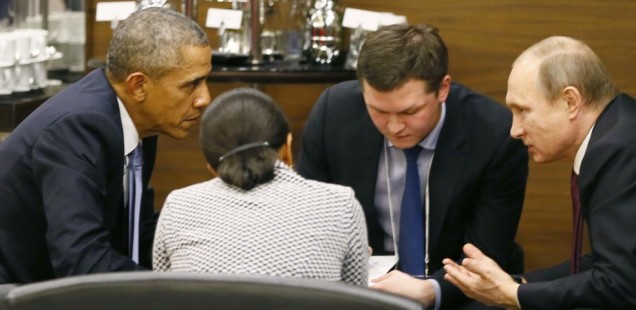
Why Allies and Adversaries Should Unite to Defeat ISIS
Suddenly, the civilized world has one thing on its mind — an alliance among key nations to fight ISIS. No one is talking about containment anymore. The topic is decisive defeat on Syrian and Iraqi battlefields and anywhere else terrorists are identified.
Three questions arise. One: Is such an alliance necessary in the post-Paris environment, or does it fall into the “nice ideas” file? Two: Is forming an alliance practical? What are the impediments?
Related: Why Paris Was the Target of the ISIS Massacre
Finally, and largest of all, could an alliance against ISIS produce consequences beyond Syria? Specifically, could it lead to a reduction in geopolitical tensions in the Middle East, or on Russia’s borders with Europe, or between Washington and Moscow?
Let’s take these one at a time.
First, an alliance that is unequivocally against ISIS is a lot more than a good idea since the attacks in Paris 10 days ago. With simultaneous attacks in Beirut and the earlier bombing of a Russian airliner over the Sinai Peninsula, ISIS has internationalized a conflict previously confined to Syria and Iraq. An alliance is urgent for two reasons.
Militarily, all efforts so far undertaken have proven ineffectual. An alliance would focus disparate strategies that often appear at cross-purposes. Politically, a united effort with agreed objectives is the best way, and maybe the only way, to achieve an orderly transition in Damascus after the threat of terror is eliminated.
Fine, but is such an alliance in prospect? While membership may include many nations, a core is essential. These are the U.S. and now France, plus Russia, Iran, and Saudi Arabia—the list alone suggests the difficulties.
Related: Culture Clash: How ISIS Could Send Europe Over the Edge
When Secretary of State Kerry discussed a peace plan with counterparts in Vienna last month, it became clear that the center of gravity for a settlement in Syria lies between the U.S. and Russia. If Washington and Moscow can’t agree to cooperate, all bets are off.
French President François Hollande, plainly galvanized by the Paris events, now seems to think so, too. Having declared the fight against ISIS a war, he confers with President Obama in Washington Tuesday and then flies to Moscow for talks with President Putin.
The core question in both capitals is obvious. To strike a deal, Americans and Russians must settle on a common priority: Is defeating ISIS the first order of business, or does that go to ousting the Assad government in Damascus.
Paris should have changed the calculus on this question for Obama, who has lost even more credibility by calling the Paris massacre “a setback.” Whether or not one thought toppling Assad was the priority two weeks ago, there’s little argument now that ISIS militants are simply a “JV team” that poses a secondary danger. The fight against them has just gone global. Removing Assad while these terrorists still roam the Syrian countryside is a prelude to Libya-style chaos, plain and simple.
Related: Blueprint for a Massacre—How ISIS Turned 9 Young Muslims into Murderers
Two top American political leaders agree. Former Secretary of Defense Chuck Hagel told Jake Tapper at CNN today that Russia and Iran have to be part of the effort to destroy ISIS. “You’re not going to find a resolution to Assad until you figure out how you’re going to deal with ISIS.”
Dianne Feinstein, Democratic Chair of the Senate Intelligence Committee, told CBS News this morning, “I think that’s very crucial,” referring to collaborative efforts to fight ISIS that include Iran and Russia.
Obama couldn’t have anticipated the attacks in the French capital, of course, but he’s wrong to keep flinching from their implications. At the annual East Asia Summit, held this year in Kuala Lumpur and just concluded, the president articulated more of the same waffle we’ve heard for many months.
“Destroying ISIS is not only a realistic goal, we’re going to get it done,” he said. He then asserted that the Russians are the impediment to action because they favor leaving Assad in place until the threat of terror is eliminated.
Related: Putin Doubles Down on Syria Bombing Campaign
That’s backwards thinking on Obama’s part, a view now shared by the global majority. Even Hillary Clinton, in her speech at the Council on Foreign Relations last Thursday, acknowledged that the chance to remove Assad in a “regime change” operation had come and gone.
One hopes Hollande can turn his try at shuttle diplomacy into a durable compromise. If he does, the rest of the core alliance should fall into place: The Iranians will probably follow Russia’s lead, the Saudis Washington’s. Then we’ve got the kind of united front that’s now needed.
Now for the big one. Let’s say an alliance against ISIS forms and sends the barbarians into the history books. Is that it? End of story?
If so, that would be a missed opportunity. Let’s not miss:This is the front door to cooperation on a broad range of shared interests. Lessening the tension between Washington and Moscow could help ease the way for an agreement on Assad and even Ukraine.
Related: 45 Million Stolen Passports Are Floating Around
At the East Asia Summit over the weekend, Ban Ki-moon pointedly urged Washington and Moscow to join hands in fighting the terrorist threat. The U.N.’s secretary-general also promised to present a comprehensive plan to counter Islamic extremism by early next year.
“These terrorists and ideological extremists should be defeated in the name of humanity,” Ban said. Translation: We have something before us now that supersedes all standing preoccupations with strategic advantage.
Vladimir Putin is up to the task. After it was clear ISIS downed the Russian passenger jet, he said, “To forgive the terrorists is up to God. But to send them to Him is up to me.”

